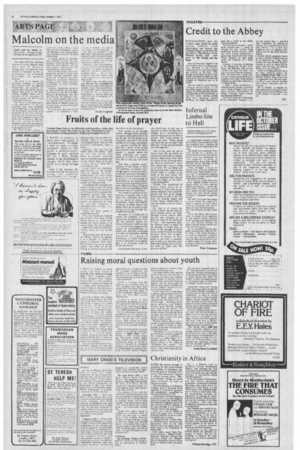Page 6, 7th October 1977
Page 6

Report an error
Noticed an error on this page?If you've noticed an error in this article please click here to report it.
Tags
Share
Related articles
Real World Of St. Matthew
Delicacy And Perfection
Youthful Handicaps
Imperfect Couples
Joyce
Raising moral questions about youth
I HAVE to confess to never having read James Joyce's A Portrait of the Artist as a Young Man ("AA", Academy One). What emerges from Joseph Strick's film is a fairly sensitive version of the general theme of a young man, particularly a lapsed Catholic, who blames his growing pains on the sins of his fathers and of his schooling.
At home in Dublin little Stephen Dedalus (Luke Johnston, up till the age of 10) suffers indeed from the usual Irish wrangling over priests, Parnell and irish history between the zealous Dante (Ivlaareen Potter), his gently orthodox mother (Rosaleen Linehan) and feckless father (T. P. McKenna), drifting into bankruptcy, and at school from bullying by boys and priest-masters.
As a very young man, Stephen (now Bosco Hogan, a persuasive young Irish actor reminiscent of Tom Courtenay) suffers from scruples, doubts, fears and the usual temptations. He toys briefly with notions of a vocation before deciding to give up his family, his country and his faith in favour of Paris and a revolutionary search for literary self-expression.
As a convert (I know this is now a forbidden category, but what cIsc are we to call ourselves?) I have always felt Catholics tend to an ex
aggerated sense of collective guilt for unhappy childhood. All schoolboys may be subject to bullying from boys or masters at any school undergoing a bad period or a weak headmaster.
Hellfire sermons like the awesome one preached here by John Gielgud may have been typical from 19th century Jesuits, as 1 understand the late, great Fr D'Arcy confirmed. They were common, too, from 20th century Presbyterians.
Stephen's more or less professional introduction to sex is only superficially different from the more bucolic experience of the little Norwegian hero of I Was Fifteen ("X", LM1 International).
This is a Norwegian essay in the Scandinavian style of explicit outspokenness, but not without some naive charm and very pretty scenery. Each of these two movies attempts to describe a universal experience in its particular local context.
Moral questions about youth are raised in a very different American context in Outlaw Blues ("AA", Warner 3, ABCs' Fulham Road, and Bayswater). Bobby Ogden (Peter Fonda), hero of this highly entertaining movie, is serving a sentence (extended by attempted escapes) in jail where he has usefully taught himself to sing and write songs. Pop-idol Garland Dupree
(James Callahan) is invited to hear him and pinches his song.
On release, Bobby's aim (and the movie's) becomes the recovery of the song, its kudos and royalties, which Dupree is enjoying. An accidental shot reverses the chase and Dupree and the police head for Mexico in hot pursuit of Bobby and his new "Album" shielded at every turn by his mobs of fans. In the whole film I could detect no decent, disinterested motive. Except possibly the prison warders, who lets Bobby tape-record his original song, everybody is out for all he can get — including even the prison governor, even Bobby's twisting agent (Michael Lerner), even, until the last second, Tina (Susan Saint James) who comes to Bobby's rescue, becomes his astute manager and eventual bride, even Bobby himself, played with some charm by Peter Fonda. Whether "Outlaw Blues" was intended to satirise the kind of film it is, or whether it should be taken straight, it succeeds triumphantly in having it both ways.
"Indulgence" is one of the key accusations in the modern jargon of film criticism. It is perfectly illustrated in India Song ("A", Camden Plaza), by Marguerite Duras, famous as the author of "Hiroshima Mon Amour." This time Duras has directed as well as written a film which seems all style and little sense.
The setting is Imperial India in 1937. There is almost no movement in the film. Through the ballroom of a Calcutta luxury hotel a succession of stately figures pass before the camera or dance statuesquely (even an old-fangled tango) to a hauntingly nostalgic, monotonous tune.
Meanwhile "voices over" (mostly Susan Sonntag's) assure us that the Vice-Consul (Michel Lonsdale) is dancing with the wife of the French Ambassador, or offer us various clues to the story of this beautiful Madame Stretter (Delphine Seyrig), which includes several lovers, one apparent murder and an attempted suicide, and to the parallel journey of an unseen beggar-woman.
No doubt Madame Duras can exert a spell. But this film lavishly indulges both her and any spectator who chooses to succumb to her magic. I found it the most enigmatic film since "Last Year in Marienbad" and not quite as fascinating, though tending in that direction.
Then Woody Allen's Annie Hall ("AA", Cinecenta, Odeon 3, Swiss Cottage, Screen on the Green), was previewed on its way to the Edinburgh Festival I recommended it as Jewish comedy at its best. It is certainly one of Woody Allen's most amusing and endearing comedies with his inimitable partner, Diane Keaton, in the title role.
Freda Bruce Lockhart
blog comments powered by Disqus









